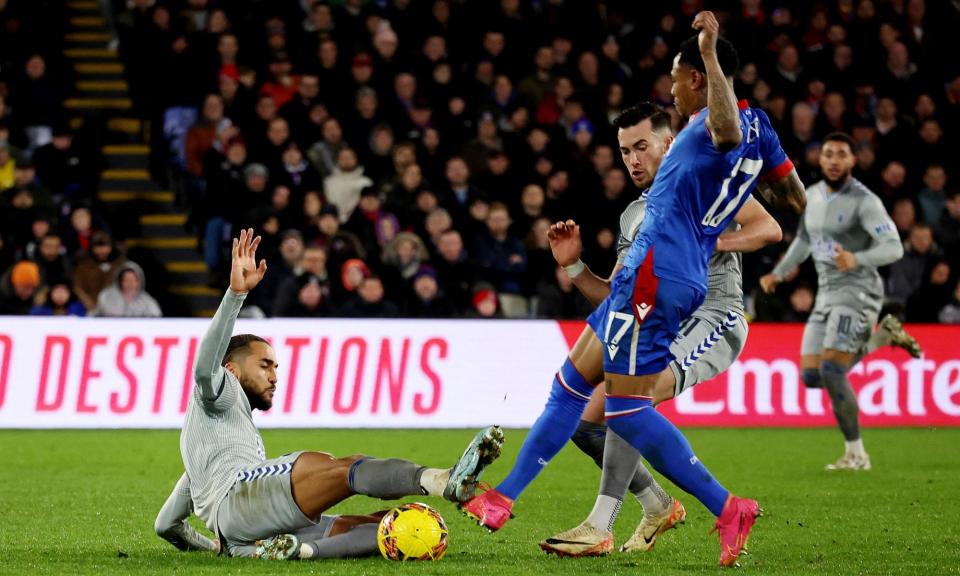Calvert-Lewin red card overshadows Crystal Palace and Everton FA Cup draw

What is VAR if not a distraction from the inconvenient business of football? This was a rotten advert for the FA Cup and a poor reflection on those who thought a Thursday night, fresh from a sprawling festive top-flight schedule, was the best time to kick off third round weekend. But football’s overuse of video intervention always leaves open the possibility of a flashpoint and controversy seekers were well served when, in the 79th minute of an earnestly fought but torpid draw, Dominic Calvert-Lewin was sent off.
Nobody had batted much of an eyelid in real time when Calvert-Lewin challenged Nathaniel Clyne just outside the Crystal Palace penalty area. Clyne went tumbling but no foul was given and the Everton striker emerged with possession. Little seemed amiss until, more than half a minute later, the portentous news of a VAR review boomed out over the Selhurst Park public address system. From there the outcome seemed set: Christopher Kavanagh ran to the screen, saw Calvert-Lewin had slid in with his studs up before glancing his opponent’s right shin, and pulled out the red card. It was harsh in the extreme.
Related: Crystal Palace v Everton: FA Cup – live
“I remain a fan but it’s beginning to test my patience,” Sean Dyche said of the video technology. “It seems a bit confused at the moment. I think we’re all aware it needs tidying up. I thought it was getting tidied up but it seems to have stepped back a little bit.”
He was correct to observe that slow motion replays have the habit of making mountains from relative molehills. “If you slow down everything, you’re going to find what you are looking for,” he continued, wondering why the same treatment was not given to a tussle between the substitute Beto and Joachim Andersen that he felt should have earned Everton a late penalty. Dyche also questioned what increasingly appears the pointless theatre of pitchside monitor checks. “Every fan out there must be going ‘What is the point?’” he said. “We all know the outcome, which is that [the referees] are going to agree with what they are being told. I don’t get all this delaying and looking at the screen for a minuscule chance they’ll turn it over. Why even bother?”
Calvert-Lewin, dismissed for the first time in his career, looked baffled as he departed. The bar for VAR’s involvement in English football seems nowadays to be scraping the floor; with that the circus too often sidelines substantive analysis of a good game and, while this never threatened to become one, it still did the event a disservice.
So did the match’s timing, although 4,000 Everton fans made it to south London on a filthy night. “I’m not sure how they’re going to get back,” pondered Seamus Coleman afterwards but nobody has yet found a cure for cup fever despite the authorities’ unstinting efforts. The visiting hordes would have seen their 10 men escape with a win they might, by a wafer-thin margin, have merited if James Garner had not skied a glorious chance soon after Calvert-Lewin’s departure.
They may have departed with some concern after Dwight McNeil was carried off on a stretcher towards the end with an ankle injury. Dyche assuaged fears of a major setback, though, saying his player’s demeanour in the dressing room afterwards had been calm.
There was little to chew on for Roy Hodgson, who gave a first start to the 19-year-old Brazilian forward Matheus Franca but saw Palace huff and puff. Eberechi Eze, booked for diving in the first half, drew a good parry from João Virginia after the restart and worked the keeper again before full-time. Jefferson Lerma also blasted wide from a decent position but there was little else to quicken the pulse. Everton had half-chances of their own before seeing their number depleted, Dean Henderson tipping over from Arnaut Danjuma and later saving a tame effort from Calvert-Lewin.
“It’s two teams that put the effort in, defended well and were difficult to break down,” the Palace manager said. “It was crying out for that wonder goal or moment of magic.” Instead, in the next breath, he found himself dutifully reflecting on the red card incident and offering qualified sympathy to the offender, who he suggested had not acted maliciously but had given the officials a decision to make.
Everyone present was left lamenting the prospect of a replay at Goodison Park. “It’s the last thing that either of us wanted in a way,” Hodgson said. Conversely football’s slowed-down soap opera came out with the kind of exhausting, deeply unfulfilling discussion point it appears to crave.

